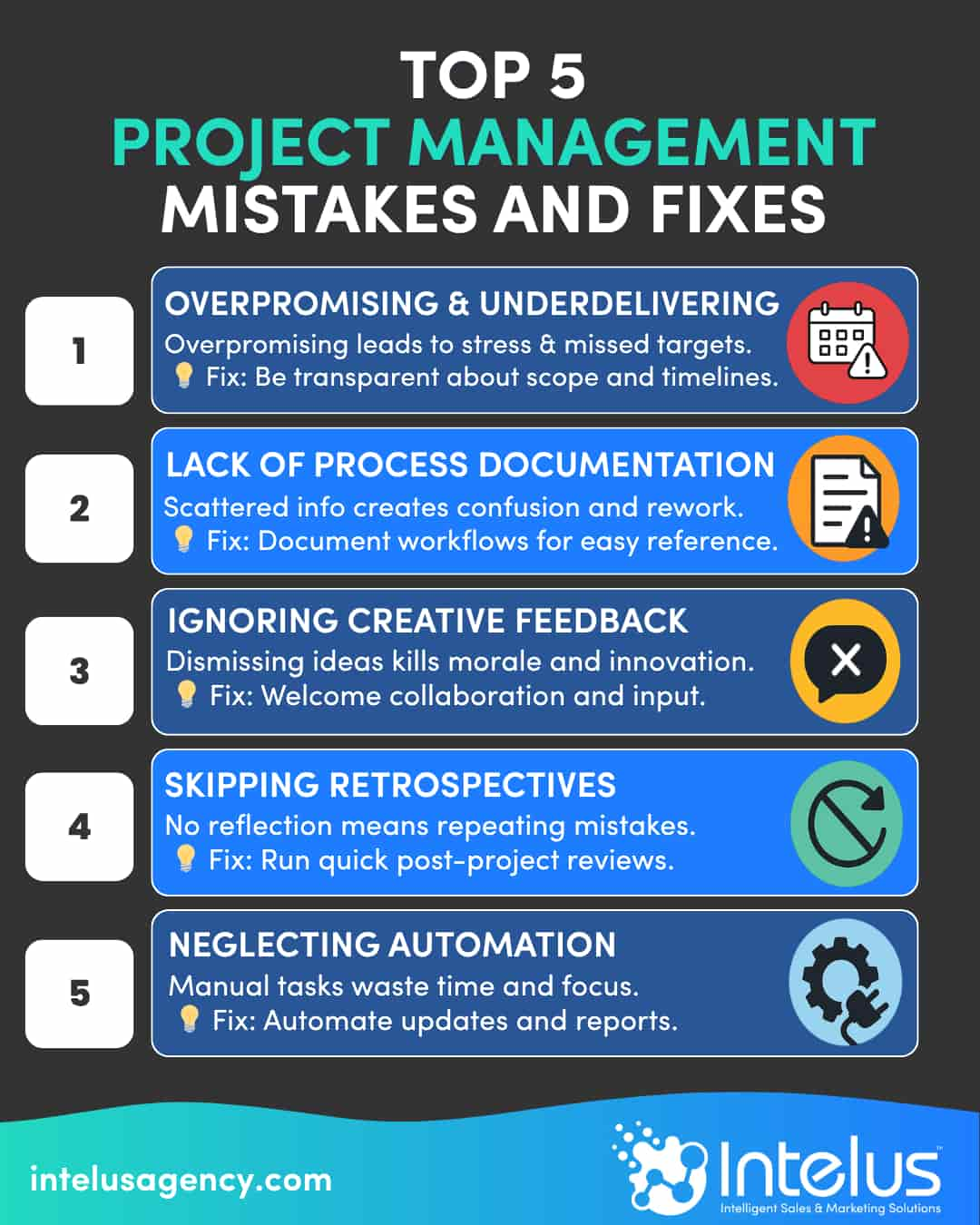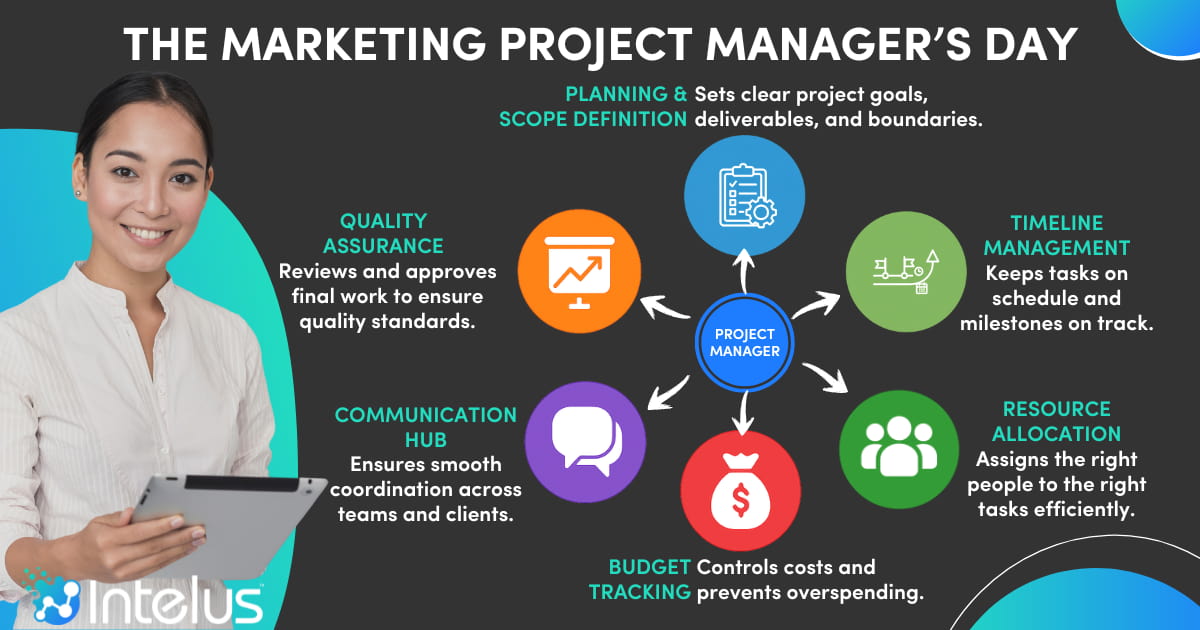The Real Responsibilities of a Project Manager in a Digital Marketing Agency (and Why They Matter More Than You Think)
.jpg)
If you’ve ever felt like your agency is one missed Slack message away from chaos, you’re not alone. Between juggling clients, creative briefs, deadlines, and constant revisions, running a marketing agency can feel like spinning twenty plates at once — blindfolded.
And right in the middle of all that? The project manager.
Project management is the hidden backbone of every successful campaign. It’s the structure that keeps everything from collapsing under the weight of competing priorities. Yet, many agency owners focus so heavily on sales and client delivery that they overlook this crucial function — until it’s too late.
Without proper project management, even the most talented team will burn out. Deadlines slip, communication breaks down, and clients quietly start shopping for a new agency. But with the right project manager, your agency transforms from a chaotic creative shop into a smooth, scalable operation.
Let’s pull back the curtain and look at what project managers really do — and why they matter more than you might think.
The Hidden Backbone of Every Successful Campaign
Think of your agency as a machine made up of brilliant, creative parts — strategists, designers, copywriters, and account managers. Each plays an important role, but without a strong framework to coordinate them, the machine sputters and stalls.
That’s where your project manager (PM) comes in. They’re not just task trackers or timeline enforcers; they’re the engine that keeps everything running smoothly.
A strong PM:
- Keeps campaigns on schedule and within scope.
- Prevents burnout by managing workload distribution.
- Protects profit margins by keeping an eye on time and budget creep.
- Bridges the gap between client expectations and team realities.
Without this structure, you’ll find yourself putting out fires instead of scaling your business. Missed deadlines, overworked employees, and frustrated clients are all symptoms of poor project management.
A skilled PM brings order to creative chaos, ensuring every moving piece comes together seamlessly — so you can focus on growth instead of damage control.
Core Responsibilities of a Project Manager in a Marketing Agency
So what does a project manager actually do all day? In short — everything that ensures the rest of the team can do their jobs efficiently and effectively.
Let’s break it down:
1. Planning & Scope Definition
Every successful project starts with a clear plan. A PM defines goals, deliverables, timelines, and responsibilities before the first draft or ad campaign ever begins. They also ensure the client’s vision aligns with the team’s capacity — balancing ambition with reality.
2. Timeline Management
Deadlines are the heartbeat of agency life. PMs create schedules, establish milestones, and make sure everyone knows what’s due when. When a bottleneck appears, they adjust priorities and resources to keep the project moving.
3. Resource Allocation
Think of this like playing chess with creative assets. PMs know who’s available, who’s overloaded, and who’s perfect for each task. The result? No more overbooked designers or idle copywriters waiting for direction.
4. Budget Tracking
Scope creep is every agency owner’s nightmare — and every PM’s battleground. They ensure hours stay within budget, tasks stay within scope, and the agency remains profitable while delivering top-quality work.
5. Communication Hub
PMs are the nerve center of the agency. They coordinate between internal teams, clients, and stakeholders — translating ideas, expectations, and feedback into clear next steps.
6. Quality Assurance
Before anything goes out the door, the PM checks that deliverables meet brand standards, align with strategy, and actually achieve what they’re supposed to.
To manage all of this effectively, strong PMs leverage workflow automation and centralized task systems like ClickUp project management software — tools that help streamline processes, track deadlines, and keep teams on the same page.
The Soft Skills That Make or Break a Project Manager
While structure and organization are essential, what separates a good PM from a great one comes down to soft skills.
Emotional Intelligence:
A great PM understands how creatives think and what motivates them. They know when a team member needs encouragement — and when to push for accountability.
Communication:
PMs are translators, converting complex ideas into clear action steps. They communicate with clients, executives, and team members in a way that’s direct, diplomatic, and actionable.
Leadership Without Micromanaging:
A skilled PM doesn’t hover. They guide, inspire, and empower their team to take ownership — leading by influence rather than control.
Adaptability:
Marketing campaigns are living things. Client priorities shift, algorithms change, and last-minute requests happen. A strong PM adapts without losing momentum.
Negotiation & Conflict Resolution:
Tensions happen — between clients and creatives, or between internal departments. PMs diffuse conflict before it derails progress, finding solutions that protect relationships and results.
In short, great PMs are part strategist, part therapist, part air traffic controller — and entirely essential. Many even share skills with top-tier executive assistants who specialize in leadership support and operations management.
Metrics That Matter: Measuring a PM’s Success
If you can’t measure it, you can’t manage it. To know whether your project managers are truly performing, track metrics that reflect both operational health and client satisfaction:
- On-Time Delivery Rate: Are projects consistently delivered by deadline?
- Budget Variance: Are actual costs close to estimated budgets?
- Client Satisfaction Scores: Are clients renewing contracts or referring others?
- Team Utilization & Retention: Are workloads balanced, or are people burning out?
- Campaign ROI: Is the agency producing better outcomes as project processes improve?
These metrics show how efficiently your agency runs behind the scenes — and how project management directly influences profitability and retention. Time-based KPIs also connect closely to strong time management skills, which are essential for agency success.
Beyond the Norm: The Orchestra Conductor Metaphor
Picture this: your agency is a full orchestra. Your strategists are the string section, creative designers are the brass, your writers handle percussion, and analysts play woodwinds.
Without a conductor, everyone plays — but no one plays together.
Your project manager is that conductor. They don’t play an instrument themselves, but they ensure harmony across every department. They set the tempo, manage timing, and guide each musician so the performance delivers one unified, powerful sound.
In this metaphor:
- The baton is the project plan.
- The orchestra is your agency team.
- The audience is your clients.
When one instrument misses a beat — a missed deadline, unclear brief, or delayed approval — the whole performance suffers. But when the PM leads with rhythm, coordination, and empathy, the result is creative brilliance delivered on time and on brand.
Common Mistakes Marketing PMs Make (and How to Avoid Them)

Even the best project managers stumble occasionally. The key is recognizing the warning signs early and building systems that prevent them from recurring.
1. Overpromising and Underdelivering:
When PMs commit to unrealistic timelines or “just say yes” to keep clients happy, they set everyone up for disappointment. The fix? Honest conversations upfront about scope and timelines.
2. Lack of Process Documentation:
If everything lives in someone’s head or in random Slack threads, chaos is guaranteed. Documentation keeps everyone accountable and enables seamless handoffs.
3. Ignoring Creative Feedback:
PMs who treat creative professionals like assembly-line workers destroy morale. Collaboration builds better results — and stronger teams.
4. Skipping Retrospectives:
After a project wraps, take time to reflect. What worked? What didn’t? What can we automate or improve next time? These lessons compound over time.
5. Neglecting Automation:
Manually updating spreadsheets and sending status updates is a waste of valuable time. Smart workflow automation can handle repetitive tasks, freeing PMs to focus on strategy and leadership.
The Future of Project Management in Digital Agencies
The role of the project manager is evolving fast. AI and automation are changing how work gets done — but not why it gets done.
Here’s what’s next:
AI-Powered Planning & Forecasting:
PMs can now use tools that predict workload issues, budget overruns, and delivery risks before they happen.
Real-Time Dashboards:
Integrated systems like ClickUp, Slack, and Google Data Studio give full visibility into campaigns — helping teams collaborate faster and make data-driven decisions.
Hybrid PM Roles:
The modern PM isn’t just operational; they blend analytics, creativity, and leadership. They’re part strategist, part problem-solver, and part performance analyst.
Human Oversight Still Matters:
AI can’t replace empathy, intuition, or leadership. The best PMs will use automation to enhance human strengths — not replace them.
Learn more about improving personal productivity through strong time management practices and supportive executive assistance frameworks.
Why Your Agency’s Growth Depends on Great Project Management

At the end of the day, project management isn’t just about timelines and task lists — it’s about growth.
A strong PM amplifies the entire agency’s performance:
- They prevent burnout by balancing workloads.
- They improve client retention through consistent delivery.
- They protect profit margins by keeping projects within scope.
- They enhance creativity by removing friction and confusion.
When you empower your PMs, you empower your entire team.
If your agency is scaling fast, don’t wait until things break to invest in project management. Whether that means hiring an experienced in-house manager or bringing on a role-trained virtual project manager through Intelus Agency, the payoff is massive.
Because at the end of the day, every campaign — every piece of content, every ad launch, every client win — starts and ends with great project management.
And when your PMs lead like orchestra conductors, your agency won’t just run — it’ll perform.









%20(1).png)
.png)
.png)
.png)
.png)